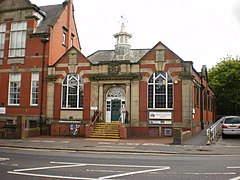Newton-le-Willows
| Newton-le-Willows | |
|---|---|
| Town | |
 Newton-le-Willows library |
|
| Newton-le-Willows shown within Merseyside | |
| Population | 22,114 (2011 Census) |
| OS grid reference | SJ580949 |
| • London | 171 mi (275 km) SE |
| Metropolitan borough | |
| Metropolitan county | |
| Region | |
| Country | England |
| Sovereign state | United Kingdom |
| Post town | NEWTON-LE-WILLOWS |
| Postcode district | WA12 |
| Dialling code | 01925 |
| Police | Merseyside |
| Fire | Merseyside |
| Ambulance | North West |
| EU Parliament | North West England |
| UK Parliament | |
Newton-le-Willows, formerly Newton-in-Makerfield, is a market town in Merseyside, England. Historically a part of Lancashire, it is situated about midway (about 15 miles (24 km) from each) between the cities of Liverpool and Manchester, 4 miles (6 km) to the east of St Helens, 5 miles (8 km) to the north of Warrington and 7 miles (11 km) to the south of Wigan. The population of the town taken at the 2011 census was 22,114.
The name Newton means "new town", while Makerfield is an ancient name for the district from a pre-English word meaning "wall", and the English word "field". Neweton was mentioned in the Domesday Book. "In Makerfield" was added to distinguish it from other Newtons and recorded as Makeresfeld in 1205 and 1351, as Makefeld in 1206, Makerefeld in 1213 and Makerfield since 1242.
Before the Norman conquest, Newton was head of a hundred. The Domesday hundred was assessed at five hides one of which included Newton. The lord of the manor was Edward the Confessor at his death in 1066. The Newton Hundred was subsequently combined with the Warrington and Derby Hundreds to form the West Derby Hundred.
It was an agricultural village, albeit with borough status, until the arrival of the railways in 1830. There was some industry: there are five cotton spinners recorded in an 1825 directory. However, it was the coming of the railways that transformed a small village into the world's first "railway town", although places such as Crewe, Derby and Swindon soon overtook Newton in size and importance. The town also developed into a major coal mining area, being on the South Lancashire Coalfield.
...
Wikipedia

